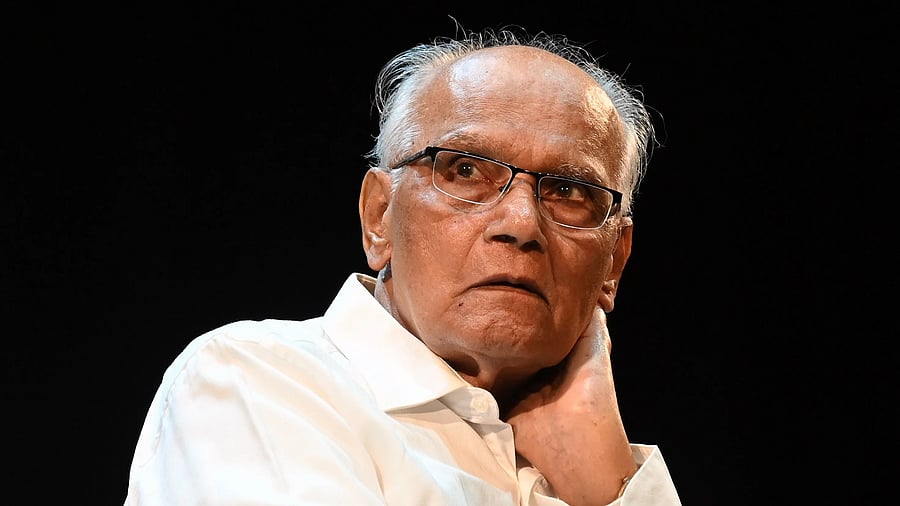
S L Bhyrappa
Credit: DH Photo
The Kannada literary world is in mourning following the passing away of S L Bhyrappa, a giant whose novels have left an indelible mark on generations of readers and have been translated into numerous languages.
Chandrashekhara Kambara recollected to DH that he and S L Bhyrappa were very close friends and used to travel together a lot. When Bhyrappa spoke, their conversations were filled with endless humor.
Kambara expressed his love and admiration for Bhyrappa's writing, noting that he had a "map" for his work and was a very good man. After returning from the US as a Fulbright scholar in 1968-69, Kambara was helped by Bhyrappa to get a job. He supported him, and they had mutual respect and love for each other. Bhyrappa was like a guru to him, he added.
P Sheshadri, a renowned Kannada filmmaker, reflected on Bhyrappa's unique craft, describing him as a writer whose works possess a powerful visual quality. "Whenever we read his works, we get an image," Sheshadri said. "For a filmmaker, the image is strong, and I see his novels visually." He has authored 24 novels in over 60 years of his literary career. 400 to 500 characters in his novels are different and unique, he added.
He highlighted novels like Vamshavruksha, Matadana, Gruhabhanga, and Nayi Neralu for their cinematic power. He had that capacity to enter into multiple characters, and the thoughts that develop in these characters he used to capture it in his writing. Sheshadri, who had a 25-year personal acquaintance with Bhyrappa, recounted the author's initial aversion to filmmakers, recalling an instance during the making of Vamshavruksha when Bhyrappa insisted that only BV Karanth could direct the film, stating, "Even if he makes mistakes, those will be creative mistakes."
For Sheshadri, Bhyrappa remains alive through his works, having secured a "chair (pita) in the hearts of the readers," a recognition the author himself valued more than the Jnanapith Award.
Literary critic TP Ashoka noted Bhyrappa's independence from literary movements such as the Navya, Dalita, and Bandaya. "He used to say that a writer should not identify himself with any ideology," Ashoka stated, that Bhyrappa's works were a product of his extensive research and personal experiences.
While acknowledging Bhyrappa's later political affiliations with the BJP and his support for Prime Minister Modi, Ashoka celebrated his literary genius, particularly highlighting Gruhabhanga as his "magnum opus" and praising his Saraswathi Samman-winning novel, Mandra.
Sudha Murty spoke to reporters, expressing her deep sorrow. She named Tabbaliyu Neenade Magane, Saartha, Gruhabhanga, Bitti (his autobiography), Dharmashree, Naayi Neralu, and Nirakarana among her favorites, calling his death a loss of one of Kannada literature's giants.
Fellow writer Vaidehi recalled reading his novels like Dhoora Saridaru, Daatu and his other popular novels during her college days. She said, "Gruhabhanga deeply influenced me and stayed with me in my heart," adding that Bhyrappa was a "very straightforward man."
Hampa Nagarajaiah lauded Bhyrappa as a writer of their generation and a major novelist after AN Krishna Rao. He emphasised Bhyrappa's discipline and extensive research, which became a hallmark of his writing process. "He used to be away from public and public events to keep himself busy in the study and his research," Nagarajaiah said. He also praised Bhyrappa's distinct use of the Hoysala Karnataka dialect, noting his fame extended far beyond Karnataka.
Vivek Shanbhag, another prominent writer, focused on Bhyrappa's superior craftsmanship. "There is absolutely no doubt," he said, that Bhyrappa was one of the best novelists in Kannada. While acknowledging ideological differences, Shanbhag maintained that Bhyrappa's dedication to the novel genre was unparalleled. "As a writer, very few people have taken this novel genre as seriously as him," he remarked.